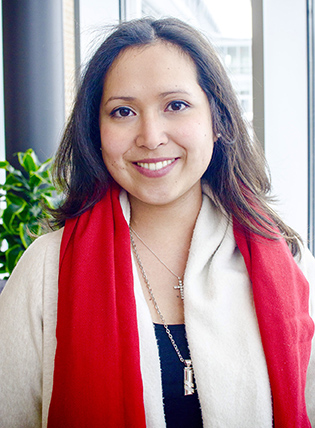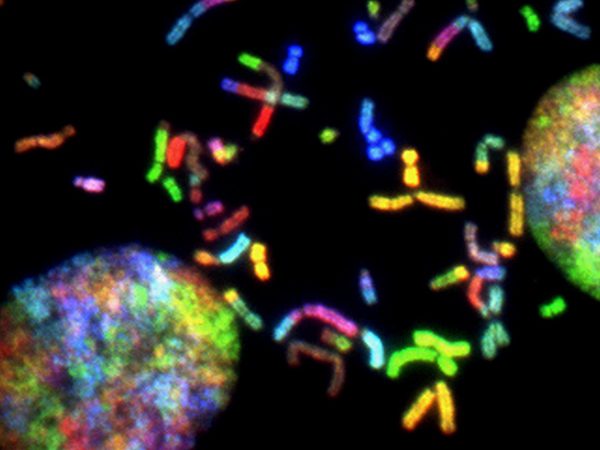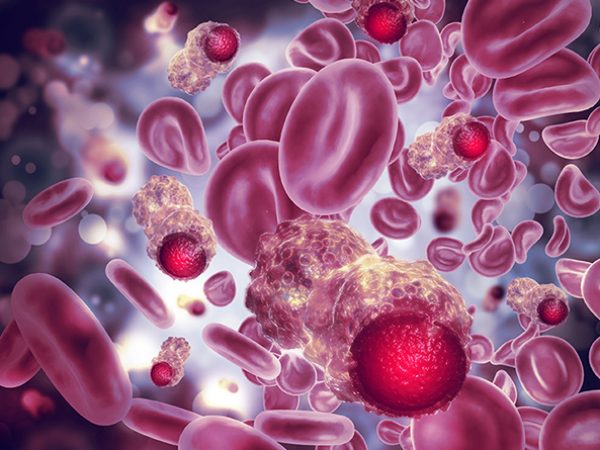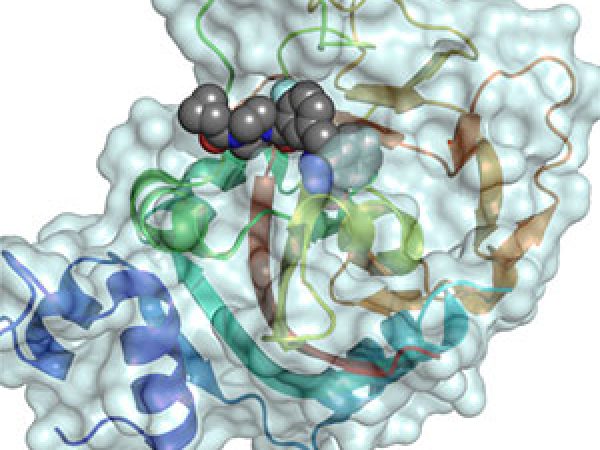Coming Full Circle
At first glance, Diana Merino is your typical predoctoral candidate. She is working toward her doctorate in medical biophysics at the University of Toronto and is a trainee at The Hospital for Sick Children in the Genetics and Genome Biology Program, which calls for long hours in the lab doing research (her focus is on pediatric brain cancer), writing papers, and searching for a postdoctoral position to enter into after she graduates. All pretty standard behaviors for a graduate student in the sciences. But Merino is anything but typical.

Diana Merino, a childhood cancer survivor and chairperson-elect of the AACR’s Associate Member Council, is pursuing her doctorate in medical biophysics at the University of Toronto.
Her connection with cancer began at a young age, when she was diagnosed with Hodgkin’s lymphoma, a cancer that originates in the white blood cells of the body. “I was 12 when I was first diagnosed with Hodgkin’s lymphoma. At that time I was living in my home country of Peru. I underwent treatment, including chemo- and radiotherapy, and was declared cancer-free less than a year later,” recalls Merino.
This brush with such a serious disease was startling for Merino and her family, but once she was declared cancer-free, they were relieved that the ordeal was over. Life moved on. She and her family immigrated to Canada. Merino started in a new school and was settling into her new life when she received the news that her cancer had returned.
“My doctors at The Hospital for Sick Children (SickKids) diagnosed me with recurring Hodgkin’s lymphoma. I had to undergo chemotherapy, an autologous stem cell transplant, and radiation. I was 15 at the time,” says Merino. Her hospital stays at SickKids were long, and provided her ample time to get to know the medical staff charged with helping her get better.
It was these long hospital stays that Merino credits for fueling her interest in biomedical science. “I think it was when I had been diagnosed for a second time that I started taking an interest in pursuing a career in health sciences. I loved learning why I would get X medicine for symptom Y, or how the radiation is supposed to kill cancerous cells. I asked a lot of questions to my doctors and nurses,” she remembers.
She was once again declared cancer-free, and was able to complete high school — with honors, no less — even after losing nearly a year of school while in treatment. After high school, she went on to study biology and nutrigenomics, the study of genetic variation on food metabolism and its implications to human health. After receiving her master’s degree from the University of Guelph in Canada, Merino decided to pursue her doctorate, specializing in cancer genetics. “Because of my personal story with cancer, I chose to investigate the genomics of brain tumors, more specifically choroid plexus carcinomas, under the supervision of David Malkin, MD, at The Hospital for Sick Children in Toronto,” she says. “This is how my path has come full circle, bringing me back to where I started as a patient, and now I’m a researcher who is passionate about studying pediatric cancer.”
Her passion is clearly evident. Merino says her study of cancer genomics is “an opportunity to give back to the research and medical community that had invested in me when I was a patient.” She has dedicated her time and efforts to causes outside of the lab as well. She joined the AACR’s Associate Member Council (AMC) and became involved with other nonprofit organizations that raise awareness about the importance of cancer research and educate childhood cancer survivors about their health risks. However, despite all of this inspiring work, life was about to throw her yet another curveball.
“In the summer of 2013, 10 years after I was declared cancer-free for the second time, I found a bump on my back while having a massage. Doctors diagnosed it as undifferentiated pleomorphic sarcoma, a type of soft tissue sarcoma, and it is very likely that it was a result of the radiation I had received many years ago to treat my primary cancer,” says Merino. She underwent radiation to reduce the size of the lesion, then had the tumor surgically removed in early 2014; today, she remains cancer-free.
“It was definitely a different and quite an interesting experience being diagnosed with cancer when I was investigating how cancer behaves,” says Merino when asked what her experience was like being a cancer researcher and a cancer patient. “I found myself fighting cancer in the lab and in my own body.” This experience gave her even more motivation to continue her work in the realm of cancer research, driving her to better understand the complexities of the disease in the hopes of one day finding a cure.
Merino is now a strong advocate for cancer research and is interested in getting involved in patient advocacy and health policy, especially in the field of childhood and adolescent/young adult (AYA) cancer survivorship. “When I was diagnosed with a secondary malignancy, I was hit with the harsh reality that those (health) risks are real, and that more research should be conducted in the field of cancer survivorship. This is driving my scientific curiosity and motivation these days,” she says. “I am interested in research that seeks to obtain a better understanding of the risks and genetic determinants of late effects in cancer survivors.”
Merino has an important message for those who might be interested in entering a career in cancer research, stressing that while research is not always easy, it is necessary. “Little by little, we are making a difference in the way cancer is fought and patients are being treated – taking into consideration their dignity and quality of life,” she says. As chairperson-elect of the AMC, she will have an excellent opportunity to work toward this goal, along with her fellow AMC members. “After my latest diagnosis, I took a greater appreciation as to the work of the AMC and how important it is to equip the next generation of cancer researchers,” she says.
When asked about what her future holds, Merino stated that she is currently exploring postdoctoral fellowship opportunities both in Canada and the United States. “I would like to remain in research, investigating predisposition to late-term effects in survivors of childhood and AYA cancers, but also advocating for increased research in this field and driving changes in the way survivors are followed up.” This promising young researcher is truly on an inspiring path, giving new meaning to the term “survivor.”



